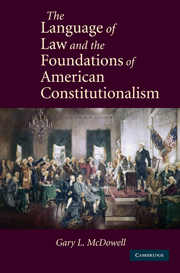Book contents
- Frontmatter
- Contents
- Preface and Acknowledgments
- The Language of Law and the Foundations of American Constitutionalism
- Introduction: The Politics of Original Intention
- 1 The Constitution and the Scholarly Tradition: Recovering the Founders' Constitution
- 2 Nature and the Language of Law: Thomas Hobbes and the Foundations of Modern Constitutionalism
- 3 Language, Law, and Liberty: John Locke and the Structures of Modern Constitutionalism
- 4 The Limits of Natural Law: Modern Constitutionalism and the Science of Interpretation
- 5 The Greatest Improvement on Political Institutions: Natural Rights, the Intentions of the People, and Written Constitutions
- 6 Chains of the Constitution: Thomas Jefferson, James Madison, and the “Political Metaphysics” of Strict Construction
- 7 The Most Sacred Rule of Interpretation: John Marshall, Originalism, and the Limits of Judicial Power
- 8 The Same Yesterday, Today, and Forever: Joseph Story and the Permanence of Constitutional Meaning
- Epilogue: The Moral Foundations of Originalism
- Index of Cases
- General Index
- References
6 - Chains of the Constitution: Thomas Jefferson, James Madison, and the “Political Metaphysics” of Strict Construction
Published online by Cambridge University Press: 05 June 2012
- Frontmatter
- Contents
- Preface and Acknowledgments
- The Language of Law and the Foundations of American Constitutionalism
- Introduction: The Politics of Original Intention
- 1 The Constitution and the Scholarly Tradition: Recovering the Founders' Constitution
- 2 Nature and the Language of Law: Thomas Hobbes and the Foundations of Modern Constitutionalism
- 3 Language, Law, and Liberty: John Locke and the Structures of Modern Constitutionalism
- 4 The Limits of Natural Law: Modern Constitutionalism and the Science of Interpretation
- 5 The Greatest Improvement on Political Institutions: Natural Rights, the Intentions of the People, and Written Constitutions
- 6 Chains of the Constitution: Thomas Jefferson, James Madison, and the “Political Metaphysics” of Strict Construction
- 7 The Most Sacred Rule of Interpretation: John Marshall, Originalism, and the Limits of Judicial Power
- 8 The Same Yesterday, Today, and Forever: Joseph Story and the Permanence of Constitutional Meaning
- Epilogue: The Moral Foundations of Originalism
- Index of Cases
- General Index
- References
Summary
There is arguably no one among the founding generation more closely associated with a particular mode of constitutional interpretation than is Thomas Jefferson with the theory of “strict construction.” Yet that association is not without its complexities. Jefferson's understanding of constitutionalism tended to be an “evolving” one, often seemingly shaped as much by pressing political necessity as by antecedent philosophical commitment. During the time the Philadelphia Convention was meeting and during the ratification battle, for example, Jefferson's constitutional thought was largely devoid of deep and abiding concerns about the sanctity of state sovereignty and what might be the potential dangers posed to it by the reach of the new federal government. On the whole, he thought the handiwork of the Convention went far toward remedying the most serious defects of the existing confederation. It was the period from 1788 until 1800 that became the crucible in which the ideological fires of Federalism would cause his Republican beliefs in states' rights and strict construction both to form and to harden. But then, after the so-called revolution of 1800, there were occasions when President Jefferson seemed willing to embrace views at odds with the strict tenets of Republicanism he had expressed in the past, causing even some of his most devoted followers to wonder.
Jefferson began as a moderate critic of the Articles of Confederation, arguing as early as 1785 that the failure of that first constitution to grant a federal power to Congress to regulate commerce among the several states was one of its more glaring imperfections.
- Type
- Chapter
- Information
- Publisher: Cambridge University PressPrint publication year: 2010



